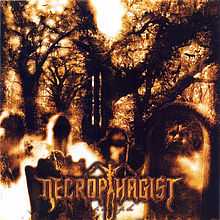Epitaph (Necrophagist album)
From Wikipedia, the free encyclopedia
| Epitaph | ||||
|---|---|---|---|---|
 | ||||
| Studio album by Necrophagist | ||||
| Released | 3 August 2004 | |||
| Recorded | "The Depth of Torment", Baden-Baden (guitars); "The Iguana Studios", March-Hugstetten (drums, vocals); "Aexxys-Art", Schwandorf (bass) | |||
| Genre | Technical death metal | |||
| Length | 32:56 | |||
| Label | Relapse | |||
| Producer | Muhammed Suiçmez | |||
| Necrophagist chronology | ||||
| ||||
| Professional ratings | |
|---|---|
| Review scores | |
| Source | Rating |
| Allmusic | |
| PopMatters | (favorable)[2] |
Epitaph is the second studio album by German death metal band Necrophagist released by Relapse Records on August 3, 2004. Unlike on Onset of Putrefaction, guitarist and vocalist Muhammed Suiçmez recorded the album alongside a full band instead of just himself. Guitarist Christian Muenzner, who later departed the band and joined Obscura, wrote both half the leads as well as several basslines on the album[3]
Track listing
All songs written by Muhammed Suiçmez except where noted.
| No. | Title | Length | |
|---|---|---|---|
| 1. | "Stabwound" | 2:48 | |
| 2. | "The Stillborn One" | 4:24 | |
| 3. | "Ignominious and Pale" | 4:01 | |
| 4. | "Diminished to B" | 4:59 | |
| 5. | "Epitaph" | 4:15 | |
| 6. | "Only Ash Remains" | 4:11 | |
| 7. | "Seven" | 3:44 | |
| 8. | "Symbiotic in Theory" (Muenzner, Suiçmez) | 4:35 | |
Total length: |
32:56 | ||
Trivia
- The ending guitar solo on "Only Ash Remains" is derived from a piece from Sergei Prokofiev's ballet Romeo and Juliet (Prokofiev) "Dance of the knights".
- The song "Seven" was used in the promotional video for Ibanez's unveiling of Muhammad Suicmez's new Signature Series guitar.
Personnel
- Necrophagist
- Muhammed Suiçmez - guitar, vocals
- Christian Muenzner - guitar
- Stephan Fimmers - bass guitar
- Hannes Grossmann - drums
- Production
- Bob Katz - mastering
References
- ↑ York, William. "Epitaph Review". Allmusic. Macrovision. Retrieved 17 October 2009.
- ↑ Begrand, Adrien (3 January 2005). "Epitaph Review". PopMatters. Retrieved 17 October 2009.
- ↑ http://christianmuenzner.com/interviews/
| |||||||||||
This article is issued from Wikipedia. The text is available under the Creative Commons Attribution/Share Alike; additional terms may apply for the media files.